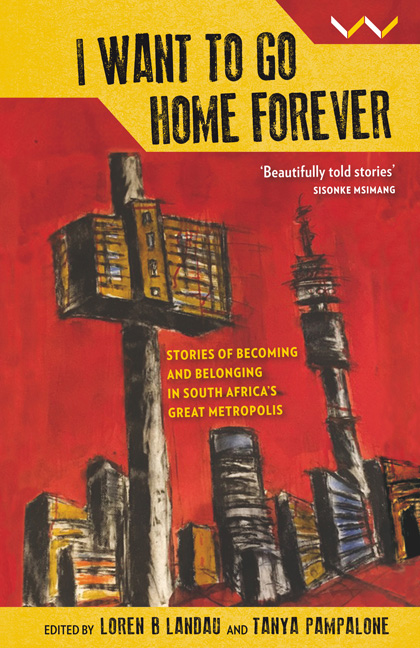Book contents
- Frontmatter
- Dedication
- Contents
- Foreword
- Preface
- Maps
- Introduction
- 1 A bed of his own blood: Nombuyiselo Ntlane
- 2 This country is my home: Azam Khan
- 3 On patrol in the dark city: Ntombi Theys
- 4 Johannesburg hustle: Lucas Machel
- 5 Don't. Expose. Yourself: Papi Thetele
- 6 The big man of Hosaena: Estifanos Worku Abeto
- 7 Do we owe them just because they helped us?
- 8 Love in the time of xenophobia: Chichi Ngozi
- 9 This land is our land: Lufuno Gogoro
- 10 Alien: Esther Khumalo*
- 11 One day is one day: Alphonse Nahimana*
- 12 I won't abandon Jeppe: Charalabos (Harry) Koulaxizis
- 13 The induna: Manyathela Mvelase
- Timeline
- Glossary
- Selected place names
- Contributors
2 - This country is my home: Azam Khan
Published online by Cambridge University Press: 29 May 2019
- Frontmatter
- Dedication
- Contents
- Foreword
- Preface
- Maps
- Introduction
- 1 A bed of his own blood: Nombuyiselo Ntlane
- 2 This country is my home: Azam Khan
- 3 On patrol in the dark city: Ntombi Theys
- 4 Johannesburg hustle: Lucas Machel
- 5 Don't. Expose. Yourself: Papi Thetele
- 6 The big man of Hosaena: Estifanos Worku Abeto
- 7 Do we owe them just because they helped us?
- 8 Love in the time of xenophobia: Chichi Ngozi
- 9 This land is our land: Lufuno Gogoro
- 10 Alien: Esther Khumalo*
- 11 One day is one day: Alphonse Nahimana*
- 12 I won't abandon Jeppe: Charalabos (Harry) Koulaxizis
- 13 The induna: Manyathela Mvelase
- Timeline
- Glossary
- Selected place names
- Contributors
Summary
Azam Khan is one of the many hawkers trading in Rosslyn, an industrial area in Pretoria North, where he repairs cellphones and sells cellphone accessories. He has lived in South Africa since 1999. Whereas many of his fellow Pakistanis tend to distance themselves from the local communities, focused on living to work so they can return home with money saved, Khan has learnt to speak Setswana, one of the 11 official languages of South Africa, and married a Tswana woman. He says he has lived for too long in South Africa to still call himself a foreigner.
Looking back in time, I cannot understand how I really ended up living here in South Africa. Maybe if I had stayed in Pakistan things would have been different for me. I would've been working there for government, maybe, and staying close to my family. But because I wasn't doing anything meaningful after school I had to find something to do.
My dream was to work as a soldier or a policeman or any other government job. I was a good sportsman back in high school, playing cricket and basketball, which means I wouldn't have struggled doing any of those jobs. I even had a bursary to complete my matric at the school where I was, simply because I was good in sports.
Our family was made up of my father, mother, three sisters and a brother in Punjab. Our parents could do anything to make us happy. My father died when I was about 16 so my mother was responsible for raising us after that. I can't say we were suffering, as such, because we never went to bed hungry. But you know a lot of people in my family, especially the extended family, always found a place to migrate to and live there. Some of them live in England and I have an aunt who lives with her family in the United States. So I was sure maybe one day I would join them.
Growing up I went to a boys’ school. When it comes to the schools, Muslims always prefer to have separate schools for boys and girls. I was a good student: my grades were usually high and sometimes I even got a prize in class.
- Type
- Chapter
- Information
- I Want to Go Home ForeverStories of Becoming and Belonging in South Africa's Great Metropolis, pp. 30 - 41Publisher: Wits University PressPrint publication year: 2018

